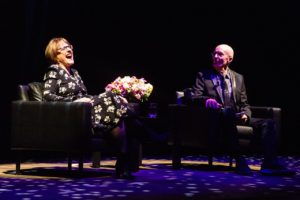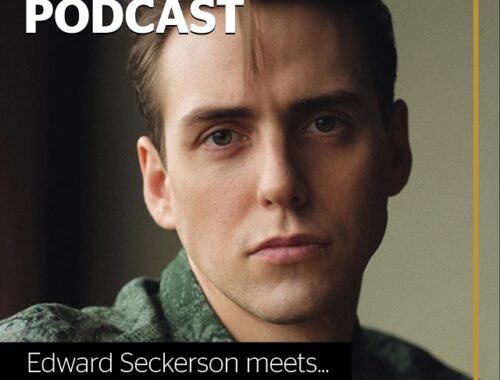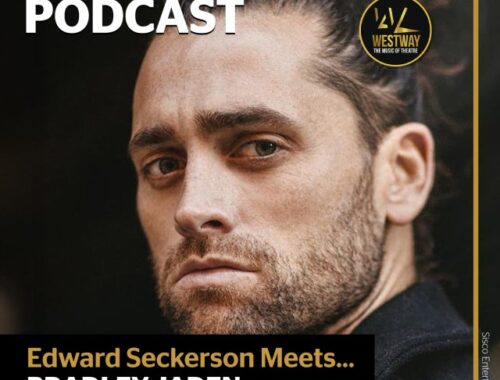GRAMOPHONE: From Where I Sit – April 2020
 As some readers may be aware, a significant proportion of my journalism these days is given over to a favourite format – the live public interview. As I write this column an exciting four days beckon during which I will share platforms with Antonio Pappano (at the Bishopsgate Institute in London), John Tomlinson (at Champs Hill, Sussex), and a brilliant young talent Keith Ramsay (Rachmaninov in the recent London premiere of Dave Malloy’s Preludes) at Pizza Express Holborn where I curate a series featuring the brightest and best of musical theatre performers. Later in the year I am honoured to be hosting two events with the great Dame Janet Baker – again at Champs Hill in Sussex and at the Ryedale Festival in her native Yorkshire. Her great friend and another great Dame – Patricia Routledge – continues to grace me with her company in our conversational show Facing the Music.
As some readers may be aware, a significant proportion of my journalism these days is given over to a favourite format – the live public interview. As I write this column an exciting four days beckon during which I will share platforms with Antonio Pappano (at the Bishopsgate Institute in London), John Tomlinson (at Champs Hill, Sussex), and a brilliant young talent Keith Ramsay (Rachmaninov in the recent London premiere of Dave Malloy’s Preludes) at Pizza Express Holborn where I curate a series featuring the brightest and best of musical theatre performers. Later in the year I am honoured to be hosting two events with the great Dame Janet Baker – again at Champs Hill in Sussex and at the Ryedale Festival in her native Yorkshire. Her great friend and another great Dame – Patricia Routledge – continues to grace me with her company in our conversational show Facing the Music.
One of my enduring bugbears is the trendy label ‘Q & A’ seemingly used to describe any event in which two or more people converse publicly. But a decent interview is never just about questions and answers. Assuming the interviewer knows their stuff, assuming their research has been sufficiently diligent – and neither, it seems, can entirely be taken for granted these days – it should go without saying that lively debate will ensure. I once asked Dame Diana Rigg what she required of a director. ‘Direction!’, she replied. Good return. The ball was back in my court and my choice of shot needed to be judicious, smart, and fast.
Over the years I have learned that 90 percent of the success of such events lies with the interviewer’s ability to put their subjects at ease. Trust is a big part of that. Trust that the interviewer has indeed done their homework but more than that can demonstrate genuine kinship with the artist’s work. It’s also safe to say that if the participants are at ease then the audience will be too. And just as with any public performance that special ‘compact’ between audience and performers will create an atmosphere conducive to sparks flying.
It’s also something of a myth that the interviewer should effectively disappear in this process. I’m of the opinion that the business of interviewing is a performance art and that the presence and personality of the interviewer should significantly complement that of the interviewee.
There’s a bit of acting involved (my years as an actor were not wasted). In the case of Patricia Routledge and Facing the Music – a show chronicling her little-known work in musical theatre – the trick is to make something that we have performed many times, something that is set in almost every detail, play like a first outing.
And like reviewing for a magazine like this one, detail is everything. Pappano and I will be talking about Beethoven’s vocal writing (he will be rehearsing Fidelio at the time) – awkward or borderline unsingable? – and the order of the inner movements of Mahler’s Sixth (like me he favours the original order of scherzo second); with Dame Janet I shall pry into her distinct colouration of the Mahler Rückert lied ‘Ich bin der Welt abhanden gekommen’ where her remote ‘white’ sound has been much imitated. A conscious or unconscious effect? Calculated or purely instinctive? On these and many other questions all shall hopefully be revealed.
You May Also Like

GRAMOPHONE Review: Richard Rodney Bennett Orchestral Works Vol. 1 – BBC Scottish Symphony Orchestra/Wilson
30/01/2018
Edward Seckerson meets JAMIE MUSCATO
06/08/2023

